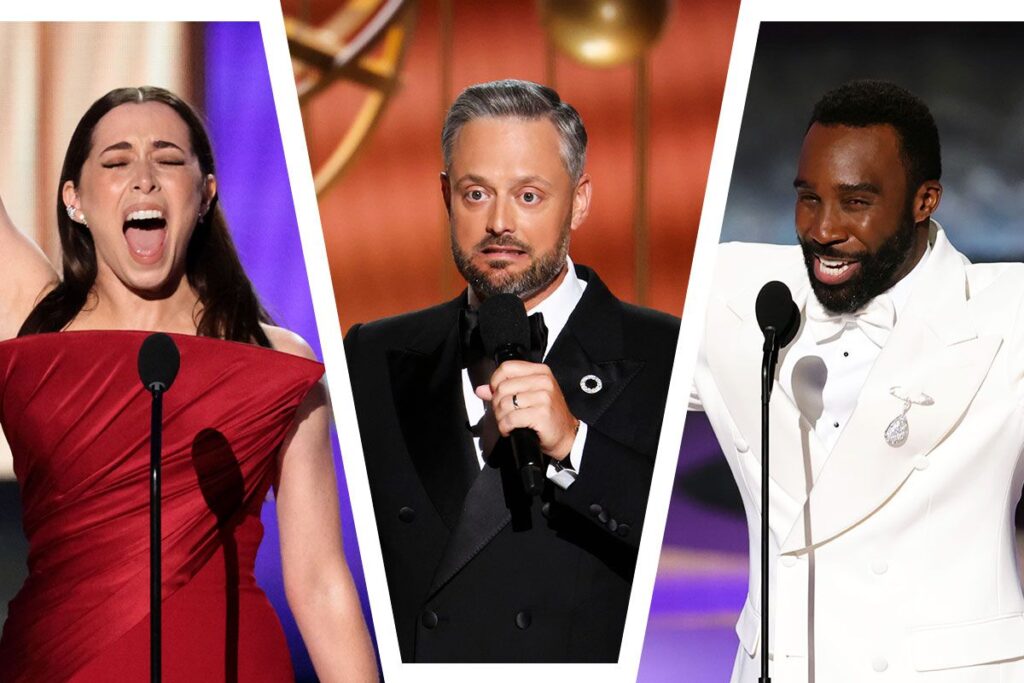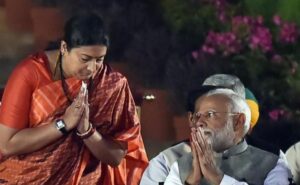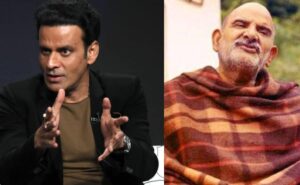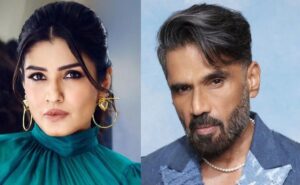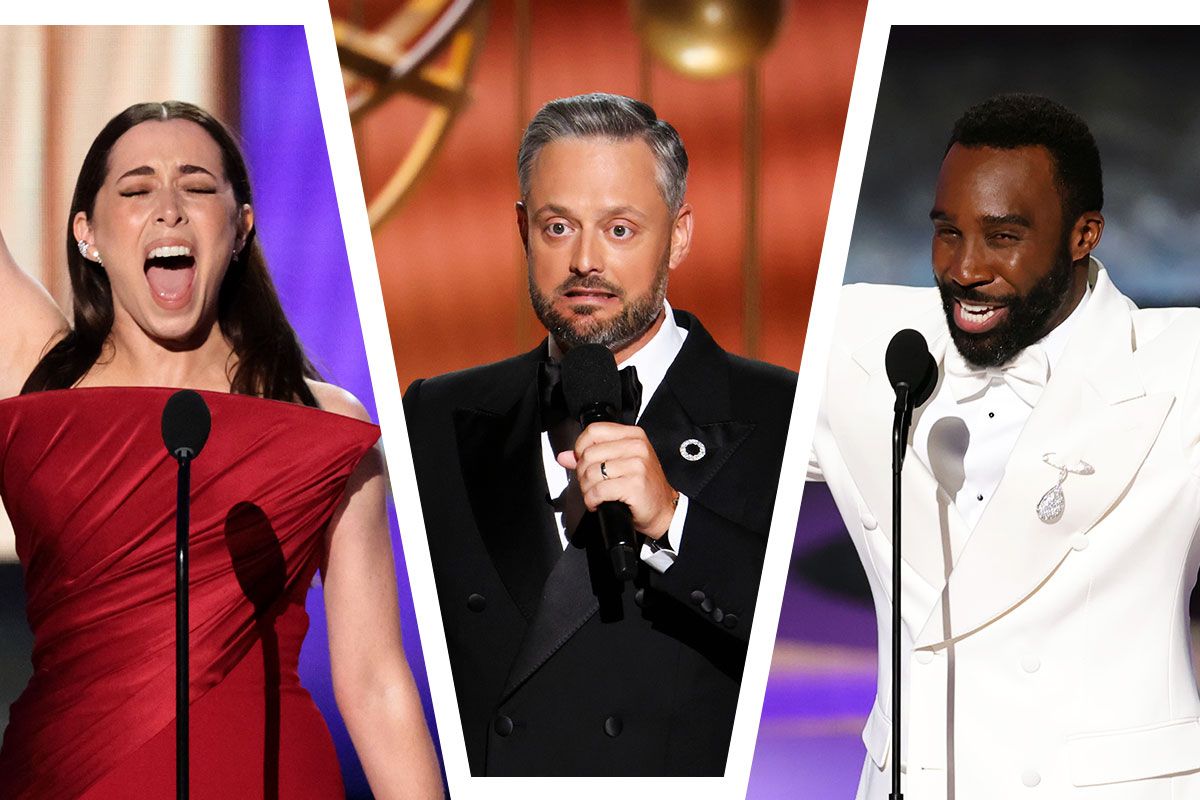
Is television a thing you enjoy? Are awards shows worth watching? The 2025 Emmys ceremony and its host seemed subtextually at war over these questions. Nate Bargatze, hired by CBS in what felt like an attempt to pander to the TV agnostic, prioritized the idea that awards ceremonies are too long over the idea that television and the people who make it are worth celebrating. In lieu of a standard monologue, Bargatze set up his main bit for the evening, involving a timer for acceptance speeches that would cut down the amount of money given to charity; as deserving winners rushed through their speeches and the total sum pledged to the Boys & Girls Club of America kept ticking lower, it cast an awkward, even antagonistic, pall over the whole affair, perhaps best encapsulated by John Oliver’s hearty (and bleeped) “fuck you” to the host as he rushed to finish his acceptance speech for Outstanding Scripted Variety Series.
The failures of the production stood out all the more as the awards themselves went to some truly deserving winners. In a year of scattered attention spans, voters sought out exciting choices, and the winners gave heartfelt and passionate speeches, despite the best attempts of Bargatze and CBS to make us feel bad for caring about their work. From Jeff Hiller’s Somebody Somewhere win to Stephen Colbert’s standing ovation, and the many tedious presenter bits in between, let’s recap the highs, lows, and whoas of a ceremony frequently at odds with itself.
HUH? … OH, LOW: The confusing non-opening monologue. For a hot second, it looked like Nate Bargatze was actually going to ditch the monologue that is traditionally how hosts open an awards show (if it’s not a musical number, which, who knows, maybe Bargatze could’ve been good at). After the opening bit, a kinda-sorta reprise of Bargatze’s Washington’s Dream sketch from his two SNL hosting gigs, Colbert took the stage to a standing ovation to announce the first category of the night. And you know what? That’s cool! Different is good. The sketch wasn’t lights-out amazing, but the switcheroo was interesting. Then, alas, after Seth Rogen’s acceptance speech for the first award of the night, Lead Actor in a Comedy Series, Bargatze wandered back onstage for a belated pseudo-monologue laying out the rules of his speech-timer gimmick, which kept going, and going, and going, grinding the show’s momentum to a halt before it even really got started.
HIGH: Tramell Tillman makes history by winning Outstanding Supporting Actor in a Drama. It took 77 years for the Emmys to award a Black man Outstanding Supporting Actor in a Drama, the last acting category to finally reach that milestone. Tillman absolutely deserved the honor, as the highlight of a second season of Severance that often felt a little flabby but was always laser-focused and highly disciplined whenever he was on screen. That mirror scene? Chill-inducing. That drum-major sequence? Unforgettable. Accepting his award, Tillman was visibly shaking as he said, “I am full, I am humbled, I am honored,” and then thanked his mother, whom he called his first acting coach and most steadfast supporter. Eat that, Eagans.
HIGH: “Go birds, fuck ICE, and free Palestine!” which is how Hannah Einbinder ended her acceptance speech for Outstanding Supporting Actress in a Comedy. Einbinder broke her three-year “nice just to be nominated” streak (while co-star Jean Smart continued her four-for-four winning streak in the Lead Actress category), and joked that she had taught herself to think that losing was actually cooler than winning. But as a winner, she made the best possible use of her time at the mic — or rather, of going over her time, ending her speech with three succinct shoutouts. The middle one was bleeped, but you can watch the footage yourself. In addition to directly confronting the current moment while other speakers tended vaguely apolitical, Einbinder threw a wrench into Bargatze’s whole speech timer bit by announcing she’d pay the difference in whatever funds she cost. After a commercial break, Bargatze bumbled through a bit where he claimed he’d follow up with Einbinder about her donation and added he might add a swear jar. Ick.
LOW: Everything about the money counter. Good intention, theoretically a funny idea, but thoroughly ghoulish in practice. Slapping the counter over a winner’s speech when they start going over time, with the money pot rapidly ticking down by the second, injected unabashed party-pooper energy into the night and sliced straight through whatever joy a winner might’ve been feeling during what’s supposed to be the highlight of their career. Worse, it added a dystopian edge to the proceedings, as if the needs of this charity were just another Hollywood plaything. All this added to what felt like a palpable hostility toward what these awards shows should actually be about: the winners. And at the end of the day, it didn’t even matter! Bargatze ended the show by revealing he’d be donating $250,000 himself while CBS will chip in $100,000, wiping out the debt that they were presumably going to force the Boys and Girls Club to pay. Sure, you might argue the bit was always going to end this way, since there wasn’t a chance they would do the organization dirty like that, but that just makes it worse for every winner who didn’t feel like they could properly savor the moment without feeling ashamed or anxious about taking money away from kids. Terrible.
LOW: Bargatze as host in general. All over the place, barely funny, underrehearsed, uncommitted to his own bits, and clearly having trouble with the teleprompter — “Gilmore Now!” — Bargatze turned in a poor performance. This may well be consistent with his “successful milquetoast comic” schtick, but as master of ceremonies for television’s biggest night, his style and performance were woefully inadequate in meeting the moment. The thing is, this was a pretty good Emmys as far as the awards were concerned, with even Andor getting well-deserved but unexpected recognition. Emmy voters delivered; Bargatze did not. It almost makes you nostalgic for Jo Koy.
WHOA: Can you believe Jeff Hiller has an Emmy now? It was a major surprise when Hiller got an Emmy nomination for his soulful, precise, warm, and absolutely hilarious performance as Bridget Everett’s best friend in Somebody Somewhere. It was easy to assume that the recognition for an admittedly very niche series would end there, but no! Somehow, Emmy voters actually seem to have watched Hiller’s work and gave it the recognition it deserves. He gave a lovely speech. Michael Urie teared up in the audience. And his “Jeff Hiller would like to thank” note displayed in CBS’s chyron ended with a shoutout to downtown New York’s essential Joe’s Pub. Let’s hope he celebrated with some ‘tinis.
LOW: Elizabeth Banks hyping up the five women nominated for Outstanding Directing for a Limited or Anthology Series or Movie … who all lost to the one man nominated. Oners are flashy, oners are impressive, oners are easy to vote for. Not to diminish how impressive it is that all four episodes of Adolescence are filmed in that uninterrupted style, nor to question Emmy voters awarding Philip Barantini for his work, but after presenter Elizabeth Banks hyped up the very high number of women nominated in the category (Shannon Murphy for Dying for Sex, Helen Shaver and Jennifer Getzinger for The Penguin, Nicole Kassell for Sirens, and Lesli Linka Glatter for Zero Day), it was pretty anticlimactic to see the one dude in the category walk away with the trophy. It was a big night for oners overall; The Studio also won a directing award for, you guessed it, “The Oner.”
HIGH: “Dan Gilroy, Andor.” Who else got goosebumps when Dan Gilroy won for Andor’s “Welcome to the Rebellion” episode, the one with that momentous speech and fantastic performance from the snubbed Genevieve O’Reilly? “Welcome to the Rebellion” was informed by history’s cycles of violence and as such became undeniably relevant to our violent present day, a singularly sharp episode of TV that captured Andor’s whole M.O. and underscored why the series was so daring and so rare. It’s disappointing that Andor lost its directing and Outstanding Drama nominations, but seeing Tony Gilroy kiss Dan on the cheek as his brother went up to accept his award was adorable. We have friends everywhere, indeed.
HIGH: Cristin Milioti loves acting so much, wooooo! In a night that often felt like it had a damper on the enthusiasm (hmmm, maybe the result of putting everything on a timer?) Cristin Milioti came to the rescue with her acceptance speech for Outstanding Actress in a Limited Series. Milioti, who went to twisted depths as Sofia Falcone, bristled with excitement as she read a speech off a piece of paper she jotted notes on in therapy, thanked her parents for showing her dark movies too young, and announced, “I love you and I love acting so much” before giving out a triumphant cheer. It’s just what you want from an acceptance speech, the sense that the person really loves the art they’re making, and it was impossible not to woo! along with her.
LOW: Still no clips of the nominees. Every awards show seems to be allergic to actually showing clips of the actors and projects that are nominated, and this year’s Emmys were no different. There were only the briefest of clips shown for certain nominees, and most had no clips shown at all — for a casual viewer watching the Emmys, your viewing experience was a pattern of Emmys presenters complaining about how winning the award didn’t change their career, Nate Bargatze complaining about people being excited for winning this award, and absolutely no context about what any of these shows were about. Neat!
HIGH: The Corporation for Public Broadcasting gets its due on the broadcast. The CPB, which supports and provides funding for the public media organizations around the country, is set to shutter next year after being effectively defunded by Republicans in Congress. In recognition, it was given this year’s Governor’s Award at last week’s Creative Arts Emmys ceremony, but the main broadcast carved out a little spotlight too. Cris Abrego, chair of the Television Academy’s Board of Governors, delivered a speech on its importance and legacy, pointedly declaring, “In moments like this, neutrality is not enough. We must be voices for connection, inclusion and empathy. Because we know that culture doesn’t come from the top down; it rises from the bottom up.” Seeing how “inclusion” is an increasingly radioactive word these days, it’s hard not to read into who and what that statement is aimed at.
LOW: The complete absence of winners thanking Sal Saperstein. You’d think, given how much Hollywood adored The Studio, that someone would whip out a stray reference to one of the funnier bits on the show. Especially Seth Rogen himself! The Studio won four awards! It broke the record for most wins by a comedy series! The bit was right there for the taking. And yet, nothing. Not a single one. A missed layup.
HIGH: The Late Show with Stephen Colbert gets its moment. With CBS sunsetting the show next year — officially for “structural reasons” though it’s hard to separate that from Paramount’s political calculus in cozying up to the Trump administration to grease the Skydance merger — The Late Show’s win felt all but guaranteed. Colbert seized the moment, closing his acceptance speech with: “Stay strong, be brave, and if the elevator tries to bring you down, go crazy and punch a higher floor!” Keep in mind, though, that this is not necessarily a swan song. The show signs off next summer, leaving Colbert with one more Emmy run before the curtain falls.
WHOA: The White Lotus gets blanked at the televised ceremony. It was a rough year for a show that had two seasons of Emmy wealth before it went to Thailand, as the HBO series only won one Emmy this year, for composer Cristobal Tapia de Veer (and that dynamic’s very awkward). But maybe it’s a good thing, creatively speaking, that the bloom’s off the lotus. It feels like Mike White may do his best work when he’s more of an underdog.
HIGH, with a side of LOW: The Pitt wins Outstanding Actor and Outstanding Drama. What do people want? Streaming television that basically operates like network television! Which is no shade to The Pitt, which offered up a fantastically compelling first season anchored by a fantastically compelling lead performance from Noah Wyle, and was bold enough in its writing to take on this country’s accelerating slide into medical disinformation and enmity toward doctors and nurses. In our dire RFK Jr. era, The Pitt actually spoke up for science and community in a divided, contentious time. (As evidenced by creator R. Scott Gemmill’s acceptance speech, in which he asked the audience to trust and protect health care workers.) Then there was Wyle’s win for Best Actor — a classic Hollywood story of awarding an actor whose return to the industry reminded us of how good we used to have it. And Wyle deserves it: he wrote, he led the cast, he was a key collaborator with Gemmill and executive producer John Wells. But it also stings a little that all this success came at the expense of Andor, a series that constantly broke conventions about what television could be, looked spectacular in every second of its 24 episodes, was exceptionally well-acted, and had an even more urgent message about the world around us and the individual cost — and glory — of standing up for what we believe in, even when we know it might cost us everything.
Related
- The 2025 Emmy Winners
- Every Single Thing That Happened at the 2025 Emmys
- Nate Bargatze’s Emmys Money Bit Is Not Working
- Nate Bargatze Dodges His Emmys Monologue Duties
The voters delivered. Nate Bargatze and his speech timer did not.

